17 start with W start with W
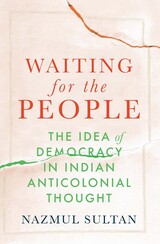
An original reconstruction of how the debates over peoplehood defined Indian anticolonial thought, and a bold new framework for theorizing the global career of democracy.
Indians, their former British rulers asserted, were unfit to rule themselves. Behind this assertion lay a foundational claim about the absence of peoplehood in India. The purported “backwardness” of Indians as a people led to a democratic legitimation of empire, justifying self-government at home and imperial rule in the colonies.
In response, Indian anticolonial thinkers launched a searching critique of the modern ideal of peoplehood. Waiting for the People is the first account of Indian answers to the question of peoplehood in political theory. From Surendranath Banerjea and Radhakamal Mukerjee to Mohandas Gandhi and Jawaharlal Nehru, Indian political thinkers passionately explored the fraught theoretical space between sovereignty and government. In different ways, Indian anticolonial thinkers worked to address the developmental assumptions built into the modern problem of peoplehood, scrutinizing contemporary European definitions of “the people” and the assumption that a unified peoplehood was a prerequisite for self-government. Nazmul Sultan demonstrates how the anticolonial reckoning with the ideal of popular sovereignty fostered novel insights into the globalization of democracy and ultimately drove India’s twentieth-century political transformation.
Waiting for the People excavates, at once, the alternative forms and trajectories proposed for India’s path to popular sovereignty and the intellectual choices that laid the foundation for postcolonial democracy. In so doing, it uncovers largely unheralded Indian contributions to democratic theory at large. India’s effort to reconfigure the relationship between popular sovereignty and self-government proves a key event in the global history of political thought, one from which a great deal remains to be learned.

Halper goes on to show how this method of war is rapidly globalizing, as the major capitalist powers and corporations transform militaries, security agencies, and police forces into an effective instrument of global pacification. Simultaneously a deeply researched exposé and a clarion call, War Against the People is a bold attempt to shine the light on the daily injustices visited on a civilian population —and thus hasten their end.
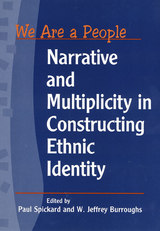
The growing recognition that ethnicity is not fixed and inherent, but elastic and constructed, fuels the essays in this collection. Regarding identity as a dynamic, on-going, formative and transformative process, We Are a People considers narrative -- the creation and maintenance of a common story -- as the keystone in building a sense of peoplehood. Myths of origin, triumph over adversity, migration, and so forth, chart a group's history, while continual additions to the larger narrative stress moving into the future as a people.
Still, there is more to our stories as individuals and groups. Most of us are aware that we take on different roles and project different aspects of ourselves depending on the situation. Some individuals who have inherited multiple group affiliations from their families view themselves not as this or that but all at once. So too with ethnic groups. The so-called hyphenated Americans are not the only people in the world to recognize or embrace their plurality. This relatively recent acknowledgment of multiplicity has potentially wide implications, destabilizing the limited (and limiting) categories inscribed in, for example, public policy and discourse on race relations.
We Are a People is a path-breaking volume, boldly illustrating how ethnic identity works in the real world.
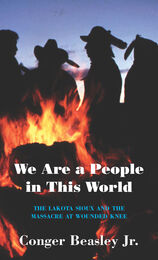
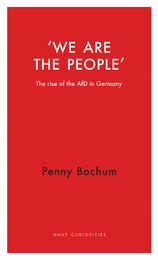
We are the People analyzes the sudden growth and radicalization of the AfD, from its Euroskeptic beginnings in 2013 to its increasing extremism. Penny Bochum shows us how the leaders’ use of inflammatory, xenophobic, and even Nazi-era language mirrors that of emerging far-right forces across much of the Western world. At the same time, through a lucid examination of the group’s ideology, Bochum shows how their brand of populism is distinct and based on German experiences and history.
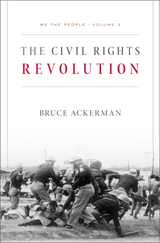
The Civil Rights Revolution carries Bruce Ackerman’s sweeping reinterpretation of constitutional history into the era beginning with Brown v. Board of Education. From Rosa Parks’s courageous defiance, to Martin Luther King’s resounding cadences in “I Have a Dream,” to Lyndon Johnson’s leadership of Congress, to the Supreme Court’s decisions redefining the meaning of equality, the movement to end racial discrimination decisively changed our understanding of the Constitution.
“The Civil Rights Act turns 50 this year, and a wave of fine books accompanies the semicentennial. Ackerman’s is the most ambitious; it is the third volume in an ongoing series on American constitutional history called We the People. A professor of law and political science at Yale, Ackerman likens the act to a constitutional amendment in its significance to the country’s legal development.”
—Michael O’Donnell, The Atlantic
“Ackerman weaves political theory with historical detail, explaining how the civil rights movement evolved from revolution to mass movement and then to statutory law…This fascinating book takes a new look at a much-covered topic.”
—Becky Kennedy, Library Journal
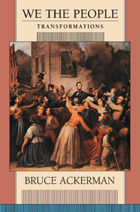
Constitutional change, seemingly so orderly, formal, and refined, has in fact been a revolutionary process from the first, as Bruce Ackerman makes clear in We the People: Transformations. The Founding Fathers, hardly the genteel conservatives of myth, set America on a remarkable course of revolutionary disruption and constitutional creativity that endures to this day. After the bloody sacrifices of the Civil War, Abraham Lincoln and the Republican Party revolutionized the traditional system of constitutional amendment as they put principles of liberty and equality into higher law. Another wrenching transformation occurred during the Great Depression, when Franklin Roosevelt and his New Dealers vindicated a new vision of activist government against an assault by the Supreme Court.
These are the crucial episodes in American constitutional history that Ackerman takes up in this second volume of a trilogy hailed as "one of the most important contributions to American constitutional thought in the last half-century" (Cass Sunstein, New Republic). In each case he shows how the American people--whether led by the Founding Federalists or the Lincoln Republicans or the Roosevelt Democrats--have confronted the Constitution in its moments of great crisis with dramatic acts of upheaval, always in the name of popular sovereignty. A thoroughly new way of understanding constitutional development, We the People: Transformations reveals how America's "dualist democracy" provides for these populist upheavals that amend the Constitution, often without formalities.
The book also sets contemporary events, such as the Reagan Revolution and Roe v. Wade, in deeper constitutional perspective. In this context Ackerman exposes basic constitutional problems inherited from the New Deal Revolution and exacerbated by the Reagan Revolution, then considers the fundamental reforms that might resolve them. A bold challenge to formalist and fundamentalist views, this volume demonstrates that ongoing struggle over America's national identity, rather than consensus, marks its constitutional history.
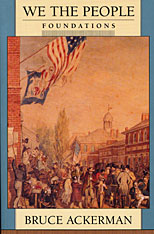
Bruce Ackerman offers a sweeping reinterpretation of our nation’s constitutional experience and its promise for the future. Integrating themes from American history, political science, and philosophy, We the People confronts the past, present, and future of popular sovereignty in America. Only this distinguished scholar could present such an insightful view of the role of the Supreme Court. Rejecting arguments of judicial activists, proceduralists, and neoconservatives, Ackerman proposes a new model of judicial interpretation that would synthesize the constitutional contributions of many generations into a coherent whole. The author ranges from examining the origins of the dualist tradition in the Federalist Papers to reflecting upon recent, historic constitutional decisions. The latest revolutions in civil rights, and the right to privacy, are integrated into the fabric of constitutionalism. Today’s Constitution can best be seen as the product of three great exercises in popular sovereignty, led by the Founding Federalists in the 1780s, the Reconstruction Republicans in the 1860s, and the New Deal Democrats in the 1930s.
Ackerman examines the roles played during each of these periods by the Congress, the Presidency, and the Supreme Court. He shows that Americans have built a distinctive type of constitutional democracy, unlike any prevailing in Europe. It is a dualist democracy, characterized by its continuing effort to distinguish between two kinds of politics: normal politics, in which organized interest groups try to influence democratically elected representatives; and constitutional politics, in which the mass of citizens mobilize to debate matters of fundamental principle. Although American history is dominated by normal politics, our tradition places a higher value on mobilized efforts to gain the consent of the people to new governing principles. In a dualist democracy, the rare triumphs of constitutional politics determine the course of normal politics.
More than a decade in the making, and the first of three volumes, We the People, Volume 1: Foundations speaks to all who seek to renew and redefine our civic commitments in the decades ahead.
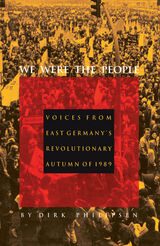
The drama We Were the People recreates is remarkable for its richness and complexity. Here are citizens organizing despite threats of bloody crackdowns; party functionaries desperately trying to survive as time-honored political prerogatives crumble beneath their feet; an oppressed people discovering the possibilities of power and freedom, but also the sobering strangeness of new political realities. With their success, East Germans encountered the overpowering might of thie Western neighbor--and stand perplexed before the onslaught of real estate agents, glossy consumer ads, political professionalism--and the discovery that a lifetime of social experience has suddenly lost all usable context. They became, in the words of one participant, a people "without biography."
Over all the recent events and unlikely turns recounted here, one thing remains paramount: the sweep of the initial democratic conception that animated the East German revolution. We Were the People brings this movement to life in all its drama and detail, and vividly recovers a historic moment that altered forever the shape of modern Europe.
Some Voices of the People
Bärbel Bohley/ "Mother of the Revolution"
Rainer Eppelmann/ Protestant Pastor
Klaus Kaden/ Church Emissary to the Opposition
Hans Modrow/ Former Communist Prime Minister
Ludwig Mehlhorn/ Opposition Theorist
Ingrid Köppe/ Opposition Representative
Frank Eigenfeld/ New Forum
Harald Wagner/ Democracy Now
Sebastian Pflugbeil/ Democratic Strategist
East German Workers
Cornelia Matzke/ Independent Women's Alliance
André Brie/ Party Vice-Chairman
Gerhard Ruden/ Environmental Activist
Werner Bramke/ Party Academic
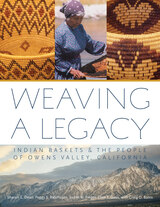
Situated on the western edge of the Great Basin between the Sierra Nevada and White-Inyo mountain ranges, Owens Valley has been home for thousands of years to the Owens Valley Paiute and their southern neighbors, the Panamint Shoshone. The willow baskets both groups created are noteworthy for their complex construction and durability, and their materials and designs reflected available resources as well as the seminomadic existence that characterized life in the Great Basin for generations.
Since the mid-nineteenth-century arrival of non-Indians into the Valley, the baskets have changed. Weaving a Legacy places those changes in the context of the region’s dramatic social history. In addition, the volume closely examines basketry techniques and technology, historic weavers and their lineages, contemporary weavers, and basket collectors.
The text is extensively illustrated with black-and-white photographs of people, landscapes, and baskets. Among the legacies of these baskets are the stories they evoke, many of which the authors recount in this beautiful work.
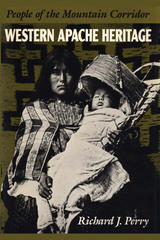
Mention "Apaches," and many Anglo-Americans picture the "marauding savages" of western movies or impoverished reservations beset by a host of social problems. But, like most stereotypes, these images distort the complex history and rich cultural heritage of the Apachean peoples, who include the Navajo, as well as the Western, Chiricahua, Mescalero, Jicarilla, Lipan, and Kiowa Apaches. In this pioneering study, Richard Perry synthesizes the findings of anthropology, ethnology, linguistics, archaeology, and ethnohistory to reconstruct the Apachean past and offer a fuller understanding of the forces that have shaped modern Apache culture.
While scholars generally agree that the Apacheans are part of a larger group of Athapaskan-speaking peoples who originated in the western Subarctic, there are few archaeological remains to prove when, where, and why those northern cold dwellers migrated to the hot deserts of the American Southwest. Using an innovative method of ethnographic reconstruction, however, Perry hypothesizes that these nomadic hunters were highly adaptable and used to exploiting the resources of a wide range of mountainous habitats. When changes in their surroundings forced the ancient Apacheans to expand their food quest, it was natural for them to migrate down the "mountain corridor" formed by the Rocky Mountain chain.
This reconstruction of Apachean history and culture sheds much light on the origins, dispersions, and relationships of Apache groups. Perry is the first researcher to attempt such an extensive reconstruction, and his study is the first to deal with the full range of Athapaskan-speaking peoples. His method will be instructive to students of other cultures who face a similar lack of historical and archaeological data.

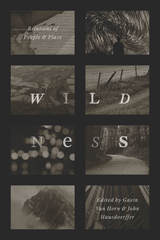
This book charts a different path. Exploring how people can become attuned to the wild community of life and also contribute to the well-being of the wild places in which we live, work, and play, Wildness brings together esteemed authors from a variety of landscapes, cultures, and backgrounds to share their stories about the interdependence of everyday human lifeways and wildness. As they show, far from being an all or nothing proposition, wildness exists in variations and degrees that range from cultivated soils to multigenerational forests to sunflowers pushing through cracks in a city alley. Spanning diverse geographies, these essays celebrate the continuum of wildness, revealing the many ways in which human communities can nurture, adapt to, and thrive alongside their wild nonhuman kin.
From the contoured lands of Wisconsin’s Driftless region to remote Alaska, from the amazing adaptations of animals and plants living in the concrete jungle to indigenous lands and harvest ceremonies, from backyards to reclaimed urban industrial sites, from microcosms to bioregions and atmospheres, manifestations of wildness are everywhere. With this book, we gain insight into what wildness is and could be, as well as how it might be recovered in our lives—and with it, how we might unearth a more profound, wilder understanding of what it means to be human.
Wildness: Relations of People and Place is published in association with the Center for Humans and Nature, an organization that brings together some of the brightest minds to explore and promote human responsibilities to each other and the whole community of life. Visit the Center for Humans and Nature's Wildness website for upcoming events and a series of related short films.
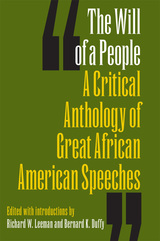
Drawing upon nearly two hundred years of recorded African American oratory, The Will of a People: A Critical Anthology of Great African American Speeches,edited by Richard W. Leeman and Bernard K. Duffy, brings together in one unique volume some of this tradition’s most noteworthy speeches, each paired with an astute introduction designed to highlight its most significant elements.
Arranged chronologically, from Maria Miller Stewart’s 1832 speech “Why Sit Ye Here and Die?” to President Barack Obama’s 2009 inaugural address, these orations are tied to many of the key themes and events of American history, as well as the many issues and developments in American race relations. These themes, events, and issues include the changing roles of women, Native American relations, American “manifest destiny,” abolitionism, the industrial revolution, Jim Crow, lynching, World War I and American self-determination, the rise of the New Deal and government social programs, the Civil Rights Movement and desegregation, the Vietnam War, Nixon and Watergate, gay and lesbian rights, immigration, and the rise of a mediated culture. Leeman and Duffy have carefully selected the most eloquent and relevant speeches by African Americans, including those by Sojourner Truth, Frederick Douglass, Frances Ellen Watkins Harper, Ida B. Wells-Barnett, Booker T. Washington, Mary Church Terrell, W. E. B. Du Bois, Marcus Garvey, Martin Luther King Jr., Malcolm X, Stokely Carmichael, Barbara Jordan, Jesse Jackson, and Marian Wright Edelman, many of which have never received significant scholarly attention.
The Will of a People is the first book to pair the full texts of the most important African American orations with substantial introductory essays intended to guide the reader’s understanding of the speaker, the speech, its rhetorical interpretation, and the historical context in which it occurred. Broadly representative of the African American experience, as well as what it means to be American, this valuable collection will serve as an essential guide to the African American oratory tradition.
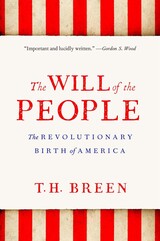
“Important and lucidly written…The American Revolution involved not simply the wisdom of a few great men but the passions, fears, and religiosity of ordinary people.”
—Gordon S. Wood
In this boldly innovative work, T. H. Breen spotlights a crucial missing piece in the stories we tell about the American Revolution. From New Hampshire to Georgia, it was ordinary people who became the face of resistance. Without them the Revolution would have failed. They sustained the commitment to independence when victory seemed in doubt and chose law over vengeance when their communities teetered on the brink of anarchy.
The Will of the People offers a vivid account of how, across the thirteen colonies, men and women negotiated the revolutionary experience, accepting huge personal sacrifice, setting up daring experiments in self-government, and going to extraordinary lengths to preserve the rule of law. After the war they avoided the violence and extremism that have compromised so many other revolutions since. A masterful storyteller, Breen recovers the forgotten history of our nation’s true founders.
“The American Revolution was made not just on the battlefields or in the minds of intellectuals, Breen argues in this elegant and persuasive work. Communities of ordinary men and women—farmers, workers, and artisans who kept the revolutionary faith until victory was achieved—were essential to the effort.”
—Annette Gordon-Reed
“Breen traces the many ways in which exercising authority made local committees pragmatic…acting as a brake on the kind of violent excess into which revolutions so easily devolve.”
—Wall Street Journal

Some parks, preserves, and other natural areas serve people well; others are disappointing. Successful design and management requires knowledge of both people and environments.
With People in Mind explores how to design and manage areas of "everyday nature" -- parks and open spaces, corporate grounds, vacant lots and backyard gardens, fields and forests -- in ways that are beneficial to and appreciated by humans. Rachel Kaplan and Stephen Kaplan, leading researchers in the field of environmental psychology, along with Robert Ryan, a landscape architect and urban planner, provide a conceptual framework for considering the human dimensions of natural areas and offer a fresh perspective on the subject. The authors examine.
physical aspects of natural settings that enhance preference and reduce fear ways to facilitate way-finding how to create restorative settings that allow people to recover from the stress of daily demands landscape elements that are particularly important to human needs techniques for obtaining useful public input
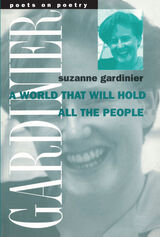
READERS
Browse our collection.
PUBLISHERS
See BiblioVault's publisher services.
STUDENT SERVICES
Files for college accessibility offices.
UChicago Accessibility Resources
home | accessibility | search | about | contact us
BiblioVault ® 2001 - 2024
The University of Chicago Press









